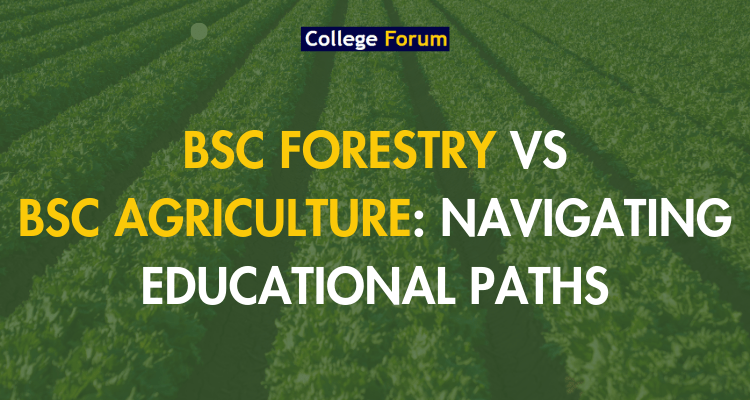The Importance of BSc Forestry
BSc Forestry, a captivating field, goes beyond the conventional image of working amidst lush green forests. It encompasses a diverse curriculum, nurturing individuals to become stewards of our woodlands. Career prospects range from forestry management to environmental conservation, offering a dynamic and fulfilling professional life.
The Importance of BSc Agriculture
On the flip side, BSc Agriculture is a cornerstone of sustainable food production and agribusiness. This degree equips students with the knowledge to address global food challenges. From crop management to agro-economics, graduates find themselves at the forefront of ensuring food security, making a tangible impact on the world.
Curriculum Differences
Delving into the academic structure, BSc Forestry emphasizes subjects like silviculture and forest ecology. Contrastingly, BSc Agriculture delves into crop science, soil management, and agribusiness. The distinctions in curriculum reflect the specialized nature of each field, tailoring education to the unique demands of forestry and agriculture.
Job Opportunities
Post-graduation, the career paths diverge. BSc Forestry graduates may find themselves working as forest managers, conservationists, or environmental consultants. On the other hand, BSc Agriculture opens doors to roles such as agronomists, farm managers, or agricultural economists. Each degree presents a spectrum of opportunities, catering to diverse interests.
Salaries and Earnings
Earnings in both fields vary based on factors like experience and location. Generally, BSc Forestry professionals enjoy competitive salaries, with experienced foresters commanding higher pay. BSc Agriculture graduates, especially those venturing into agribusiness or agricultural economics, often find lucrative opportunities in the ever-evolving agricultural sector.
Industry Demand
The demand for skilled professionals in both forestry and agriculture remains robust. With increasing environmental concerns, BSc Forestry experts are sought after for sustainable land management. BSc Agriculture professionals, contributing to food production, are pivotal in addressing global food security challenges, ensuring continuous industry demand.
Skill Sets Required
To excel in these professions, distinct skill sets are essential. BSc Forestry demands skills in forest management, conservation, and environmental impact assessment. Meanwhile, BSc Agriculture requires expertise in crop management, soil science, and a keen understanding of agricultural economics. Both disciplines necessitate a passion for sustainability.
Environmental Impact
Both BSc Forestry and BSc Agriculture play pivotal roles in environmental conservation. BSc Forestry focuses on maintaining ecological balance in forests, while BSc Agriculture seeks sustainable farming practices to mitigate environmental impact. Understanding these roles is crucial for individuals aiming to contribute positively to the planet.
Research Opportunities
For those inclined towards research, both fields offer exciting avenues. BSc Forestry students can delve into studies related to forest ecosystems, biodiversity, and climate change. BSc Agriculture enthusiasts may contribute to research in crop improvement, precision farming, and sustainable agriculture practices, furthering innovation in the agricultural sector.
Challenges and Rewards
No career path is without its challenges. BSc Forestry professionals may face hurdles in navigating complex environmental regulations. In contrast, those in BSc Agriculture might encounter challenges related to changing climate patterns and global market dynamics. However, the rewards, such as contributing to sustainability and food security, outweigh the challenges.
BSc Forestry vs BSc Agriculture
In this comprehensive section, we analyze the two degrees side by side. From course structures to career trajectories, gain a holistic understanding of what sets BSc Forestry apart from BSc Agriculture, aiding you in making a well-informed decision about your academic journey.
FAQs
Q: Can I switch from BSc Forestry to BSc Agriculture or vice versa during my course?
A: Generally, it’s possible, but it’s advisable to consult with your academic advisor for a smooth transition.
Q: Are there international job opportunities for graduates in both fields?
A: Yes, both BSc Forestry and BSc Agriculture graduates can explore international job markets given the global nature of environmental and agricultural challenges.
Q: How does the environmental impact of BSc Agriculture compare to BSc Forestry
? A: While both contribute to sustainability, BSc Forestry has a more direct impact on preserving natural ecosystems, whereas BSc Agriculture focuses on sustainable farming practices.
Q: What are the emerging trends in the forestry and agriculture industries?
A: Sustainable practices, technological advancements, and the integration of data science are shaping the future of both industries.
Q: Can you specialize further within BSc Forestry or BSc Agriculture?
A: Yes, both degrees offer specialization options, allowing you to tailor your education to specific areas of interest.
Q: Are internships essential for securing a job after graduation?
A: Yes, internships provide valuable practical experience and enhance your employability in both fields.







